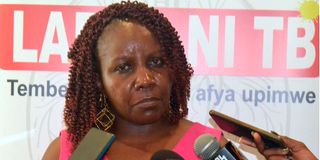Ministry starts tracking missing TB patients

Chief National Coordinator Stop TB Partnership-Kenya Evaline Kibuchi (left) and Head of Tuberculosis Programmes in Kenya Jackie Kisia address journalists at Pride Inn Paradise Hotel in Mombasa on November 23 during the 6th Lung Health Conference.
Health workers in public and private hospitals across the country will now be required to test all patients with prolonged coughs, weight loss and fatigue for Tuberculosis (TB) as the country tracks thousands of untraceable patients battling the disease in the community.
The Ministry of Health has directed doctors to conduct the tests and enroll patients for treatment. Kenya is ranked among the high burden TB countries in the world. Last year, around 140,000 people in Kenya were estimated to have TB, according to the Ministry of Health.
Statistics from the ministry show that out of the 140,000 TB cases, only 77,000 have been notified and put on treatment, with around 42 per cent of TB patients untraceable. TB notification is the process of reporting diagnosed TB cases to relevant health authorities, which in turn report them to the World Health Organisation (WHO) through National TB Programmes or their equivalent.
“Our target is 140,000 cases, which are supposed to be notified. But we have only notified around 77,000. We are missing almost 42 per cent of TB patients as per our 2021 data. TB is very contagious – it’s spreading in our community,” warned Dr Jacqueline Kisia, the head of Care and Treatment Section, Division of National Tuberculosis Leprosy and Lung Disease, in Kenya.
Speaking during the Kenya International Scientific Lung Health Conference in Mombasa, Dr Kisia said Kenya is “missing” TB cases because healthcare workers have no capacity of diagnosing the disease. However, she said the challenge can be addressed through training of health workers and providing diagnostic equipment in all healthcare facilities, adding that the Ministry of Health is working hard to ensure all cases are captured.
According to data from the ministry, Nairobi, Mombasa, Meru and Nakuru are the four leading counties in TB prevalence.
Dr Kisia said most TB cases are prevalent among men aged between 15 and 65. She urged patients to ensure they complete their TB treatment to prevent the development of drug resistance and other complications.
“If not treated, TB kills. Smoking increases your chances of developing TB, so you should avoid it. Excessive alcohol consumption lowers your immunity, which could make you more vulnerable to TB. Avoid excessive drinking,” she warned.
She urged patients who have coughs of any duration, weight loss and fatigue to be tested for TB.
Dr Kisia said the government has put measures in place to ensure the cases are not missed. This follows the introduction of a diagnostic tool — the Genexpert, which detects sensitive and drug-resistant TB.
She added that the ministry is also training health workers on diagnosis and management of TB.
“We also have technical support from the National Programme, which trickles down to the lowest facilities within communities,” added Dr Kisia.
Chief National Coordinator Stop TB partnership-Kenya Everline Kibuchi said TB receives the least allocation despite being a killer disease.
“In 2020 alone, we lost 21,000 people to the disease yet it’s curable, preventable and treatable. We are very low on awareness,” said Ms Kibuchi.
She blamed the government for failing to create awareness about the disease. She further urged the Ministry of Health to ensure access to TB services — diagnosis, treatment and care — and called on President William Ruto to invest in TB to save lives.
TB continues to be a major public health concern in Kenya. In 2020, the country recorded 72,943 TB cases of whom 8 per cent (5,663) were children.
Early this year, Acting Director-General for Health Patrick Amoth said the Covid-19 pandemic threatened years of progress in TB control having disrupted health systems.
“This resulted in a reduction in the number of TB patients diagnosed and a rise in those interrupting treatment. Similarities between TB and the pandemic present an opportunity to control these diseases effectively without significant additional stress on the country’s health system,” said Dr Amoth.
He said the government through the National TB Programme in collaboration with development partners is seeking to actualise a TB-free Kenya.
“We need to intensify TB case-finding at the grassroots, increase lab diagnosis and treatment of TB, particularly in children and special conditions as well as improve the management of drug-susceptible and drug-resistant TB,” he added.
Matungulu MP Stephen Mule, who is also the chairman of Africa Parliamentary Tuberculosis Caucus, said Kenya should evaluate how it is dealing with TB among inmates, children and expectant mothers.
“Kenya has been ranked as one of the countries with high prevalence rate of TB. But all in all, we have made tremendous improvements. In 2018 we had a high-level meeting in New York where we made declarations and targets were given for different countries,” said Mr Mule.
He urged governors in the 47 counties to put more effort in dealing with TB at the grassroots level.



